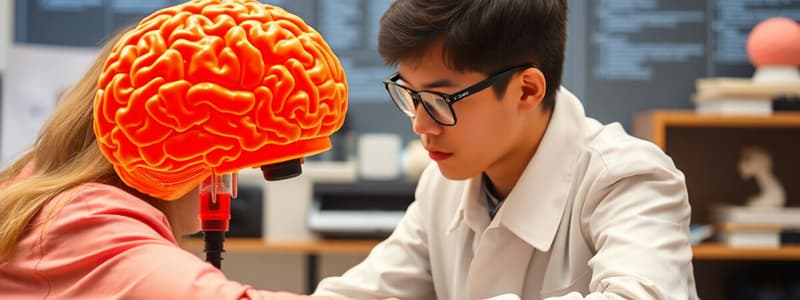Podcast
Questions and Answers
What is the primary focus of experimental/cognitive psychology?
What is the primary focus of experimental/cognitive psychology?
- The scientific study of mind and behavior through experiments (correct)
- Emotional responses and behaviors
- Observation of social interactions
- Developmental stages of childhood
Which of the following is NOT considered a cognitive function?
Which of the following is NOT considered a cognitive function?
- Imagination
- Memory
- Perception
- Emotional expression (correct)
Cognitive processes are mechanisms that underlie which of the following?
Cognitive processes are mechanisms that underlie which of the following?
- Cognitive behaviors like memory and decision-making (correct)
- Physical health and well-being
- Personality traits and characteristics
- Social interactions and relationships
How does experimental psychology relate to cognitive neuropsychology?
How does experimental psychology relate to cognitive neuropsychology?
Which cognitive function is primarily involved in the task of 'eating peas'?
Which cognitive function is primarily involved in the task of 'eating peas'?
What is the independent variable in the relationship between food packaging and shelf life?
What is the independent variable in the relationship between food packaging and shelf life?
Which factor is associated with plant growth as a dependent variable?
Which factor is associated with plant growth as a dependent variable?
Which statement best describes the relationship between wind strength and wave height?
Which statement best describes the relationship between wind strength and wave height?
Which scenario represents a potential third variable problem?
Which scenario represents a potential third variable problem?
What is the implication of stating that correlation is not evidence for causation?
What is the implication of stating that correlation is not evidence for causation?
Flashcards are hidden until you start studying
Study Notes
Experimental/Cognitive Psychology
- Experimental psychology examines mind and behavior through scientific experiments.
- Cognition encompasses all mental processes leading to thoughts, knowledge, and awareness.
- Cognitive processes dictate cognitive functions such as attention, memory, learning, decision-making, language, perception, and motor skills.
- Cognitive functions are fundamental components of complex behaviors.
Experimental Psychology and Neuropsychology
- Links exist between experimental psychology and cognitive neuropsychology.
- Brain damage in patients can provide insights into specific brain functions.
- Independent variables (causes) impact dependent variables (effects) in research, illustrated by examples like food packaging and shelf life.
Correlation vs. Causation
- Correlation between variables does not imply causation; a third variable may influence observed relationships.
- Example: A notable association exists between television viewing and later aggressive behavior over 17 years, emphasizing the need for caution in interpreting correlation as causative.
Sensation and Perception
- Traditionally recognized senses include sight, hearing, taste, smell, and touch, with additional perceptions such as kinesthetics and balance.
- Psychophysics measures stimulus strength and observer sensitivity, assessing absolute thresholds for detection.
Absolute Thresholds
- Detection is not binary; factors like noise and response criteria affect perception.
- A response criterion influences detection threshold; a lenient responder shows a lower threshold.
Vision: Components and Function
- Light enters the eye through the cornea, which refracts and protects the internal structures.
- Light passing through the pupil is absorbed by the retina, which may reflect back in bright conditions.
- The lens fine-tunes refraction, with ciliary muscles adjusting its shape to focus light on the retina.
Color Perception Theories
- Opponent-process theory categorizes primary colors into pairs (red-green, blue-yellow, black-white) affecting perception through inhibitory processes at the ganglion level.
- Trichromatic theory explains color perception using three primary colors (red, green, blue) combined in various proportions.
- Both theories offer complementary explanations of color vision: one at the receptor level, the other at the neural level.
Color Blindness
- Opponent-process theory accounts for red/green color blindness, the most common type affecting males (~8%) more than females (~1-2%).
- Ishihara test identifies color deficiencies, testing the ability to perceive numbers hidden within colorful patterns.
Studying That Suits You
Use AI to generate personalized quizzes and flashcards to suit your learning preferences.




